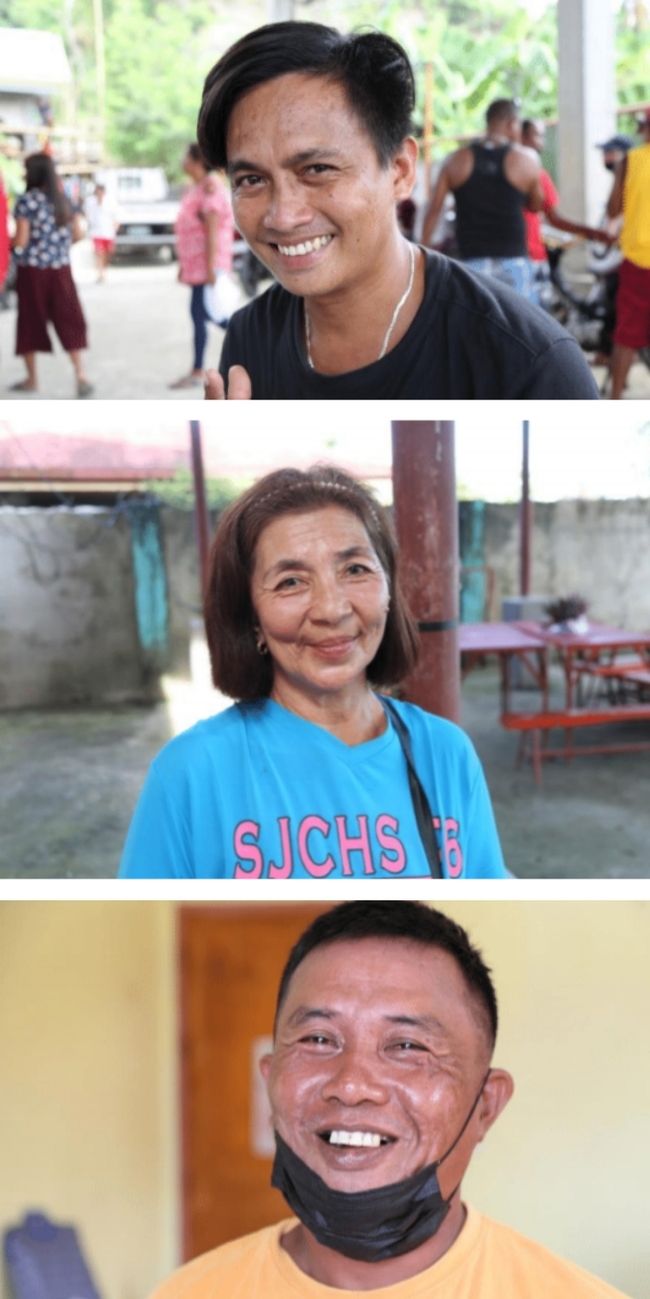Stories of Change

Top: Ryan Ray, Middle: Feliana Chao, Bottom: Noel Sebucao
A Time of Relief, Recovery and Resilience
When Typhoon Rai hit the Philippines in December 2021, survivors’ lives were flipped upside down. The effects of the disaster were catastrophic for thousands who lost family members, their homes, food, belongings and source of income. To support those affected we teamed up with the Center for Disaster Preparedness Foundation and developed a long-term response. The program was funded by the Japan Platform and has been operating since early February.
The first step towards recovery began with cash grants that families could use to repair their damaged houses. Along with his 10-year-old daughter and pregnant wife, Ryan Ray survived the disaster because he realized the severity of the typhoon and acted fast. He shared, “the devastation of Super Typhoon Haien, which hit the same island of Leyte in 2013, came to mind. I hurriedly took my wife and daughter and evacuated to my uncle’s house on high ground.” Unfortunately, the family’s house did not survive, and Ryan and his family have been living in a small hut they built with palm leaves and materials they gathered from the rubble. With CWS’ help, however, they are eager to begin rebuilding their home. “With the birth of our new child on the horizon, we are grateful for the support of CWS to help us repair the house,” Ryan said.
In the same town as Ryan, town official Feliana Chao was patrolling the streets and urging residents to evacuate as the typhoon approached. As she did this, however, she worried about her son, who lived nearby and struggles with mental illness. Following the disaster, she learned that although neighbors tried to urge her son to leave his home, he refused and was injured as a result. Both Feliana’s and her son’s homes were entirely destroyed by the typhoon, so both have been sheltering with Feliana’s other adult children. Feliana worries about the burden she is creating for her other children and adds, “as a parent, I am concerned about my son and want to live with him so that I will not be late to escape when another similar typhoon hits.” Feliana plans on leaving with her son and building a new home together. She said, “CWS’s support will be a great help in building a safe home for my son and me to live in together.”
For other members of the community, the disaster hit more than just their homes. Noel Sebucao, who also lost his home, shared, “my livestock had been wiped out… my two children, who are now entering puberty, also seem to be unable to get on with their schoolwork.” For Elena, escaping her home was extremely difficult due to a leg injury she suffered six years ago which still prevents her from walking properly. Following the disaster, she recounted, “when I returned to my house the next morning, it was covered in mud. I lost all of my household goods and house overnight.” The support she received from CWS gave her much-needed relief. “I thought it would be more and more difficult to rebuild, but then I received support from CWS Japan. Thank you very much.”
For survivors like Noel, Elena, Ryan and Feliana, the journey toward recovery does not end with rebuilding a safer home. Through our program, we are working with community leaders to provide victims with mental health and psychosocial support to aid in the survivors’ healing. To prevent the spread of diseases, we are also improving access to water and sanitation for affected people through the establishment of water points and education on best hygiene practices. Lastly, we are also working to develop resilience by developing disaster management plans to prepare the community in the case of another disaster. Through this project, our goal is to not only provide relief for those affected but to build a stronger community that will be ready to endure any future disasters.
